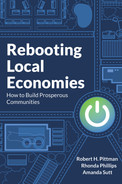Movies about space exploration often show humankind at our best—smart, daring and above all, working together. The Right Stuff and First Man, respectively, tell the success stories of achieving earth orbit and landing on the moon. Apollo 13, on the other hand, begins as a story about failure but ends as a testimony to how people at all levels and pay grades came together to avert disaster and save three brave astronauts. These movies show that while the astronauts obviously must be well-trained and knowledgeable, the support teams must be equally capable. Their knowledge of the astronauts, their spacecraft, and the mission was crucial to success.
The same logic applies to building prosperous communities. Success is more likely when teams that are knowledgeable and supportive of the mission back community and economic development professionals and others working on the frontlines. Who are the support teams for community prosperity? The short answer is that all residents should work to make their community a better place, but key mission team members such as elected officials, civic board members, and other community leaders can spearhead the effort. And, as in space exploration, the more that community residents and team members know about community and economic development, the more likely the mission of community prosperity will succeed.
Our book An Introduction to Community Development, published by Routledge in 2009 with a second edition in 2015, was primarily intended to be used as a textbook for community and economic development courses. However, it was also purchased by a variety of users outside of the academic market. Several of the purchasers told us they bought the book because it was a good blend of theory, principles, and practice. The book was well received in part, we believe, because of this blend. One journal reviewer referred to us as “pracademics,” a badge we wear proudly.
During the past few years, we have received a number of requests to write a book for the “support” team members—elected officials, board members, stakeholders, and citizens of all stripes who want to improve their community. We hope this book will fulfill those requests. A mirror image of An Introduction to Community Development, this book is primarily a “how to” guide for building prosperous communities, with just a pinch of theory thrown in to explain the principles. When it comes to building prosperous communities, good leaders can get you into orbit, but good leaders knowledgeable about community and economic development can get you to the moon.
We are fortunate to have been involved in community and economic development from a broad range of perspectives including teaching and research, consulting and actual practice. While research is growing and generating many useful results, community and economic development are still applied disciplines where much is learned through experience. The Janus Institute (janusinstitute.org), sponsor of the Janus Forum, which brings community and economic development professionals and community leaders together for peer learning and networking, and Rock Paper Scissors, a cutting-edge branding and marketing firm, have partnered to launch ProsperousPlaces.org as a resource to help communities create their roadmaps to prosperity. The website is an extension of this book, offering additional tools and shared knowledge to help communities move forward. We will update the site and travel with you along your community’s road to prosperity.
We would like to thank our publisher Business Expert Press for recognizing the value and need for this book. BEP personnel are a pleasure to work with. Our thanks also to staff members who created the figures and illustrations in the book, assisted with research, proofed and cleaned up the manuscript, and helped in many other ways—from Rock Paper Scissors: Valerie Kinney, Kaitlin Henre, and Kimmie Zlatunich; and from Piedmont University: Cindy Nimmo. Piedmont University in Demorest, Georgia, provides support to the Janus Institute for which we are very grateful.
We would also like to acknowledge our families and friends who encouraged us through the laborious and time-intensive process of writing a book. We convey to them our thanks but also the bad news that we will undoubtedly be back at it again soon.
Robert H. Pittman
Rhonda Phillips
Amanda Sutt
